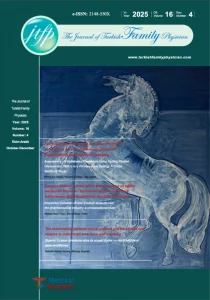The effect of sociodemographic characteristics on healthy lifestyle behaviors in pregnant women registered Family Health Center
The Introduction: Pregnancy is a critical period in which women experience many physical, psychological and social changes. Studies reveal that the lifestyle adopted during pregnancy has a long-term effect on the health and quality of life of the child, mother and even the whole family. It is known that sociodemographic characteristics determine the health of individuals.
Aim: The aim of this study is to reveal the effect of sociodemographic characteristics of pregnant women on healthy lifestyle behaviors.
Method: This is a cross-sectional analytical study. 105 volunteer pregnant women who applied for any reason and/or were invited to participate in the study by phone call between March and April 2022 were recruited. Sociodemographic characteristics were questioned with a questionnaire prepared by the researchers. The Health Promoting Lifestyle Profile II (HPLP-II) was used to evaluate the lifestyles of pregnant women. The data obtained were evaluated with the independent t-test and ANOVA tests in the SPSS 20.0 program.
Results: A total of 105 pregnant women between the ages of 19-42 were included in the study. The mean age was 29.23 ± 4.8 years, and 77% (n=81) had a high school or higher education. 56.2% (n=59) of the participants have a monthly income of 8000 TL or less. 11.4% (n=12) of the pregnants were in the first trimester, 50.5% (n=53) in the second, and 38.1% (n=40) in the third trimester. The mean scale score of the participants was calculated as 133.9±22.5 and 2.6±0.4 out of four. Although the total scale mean score of the groups with high education and income levels and working pregnant women was higher, no statistically significant difference was found between the total scale score of education level, income level, and employment status (p=0.281, p=0.192, p=0.804, respectively). The mean total scale score of the pregnant women who used regular medication was found to be higher than those who did not use drugs (p=0.017).
Conclusion: It has been observed that pregnant women who use regular medication adopt a healthier lifestyle. Education level, income level, employment status and the presence of social security were not found to have a significant effect on the adoption of healthy lifestyle behaviors by pregnant women.
References
- Gökyıldız S, Alan S, Elmas E, Bostancı A, Küçük E. Healthpromoting lifestyle behaviours in pregnant women in Turkey. International journal of nursing practice 2014;20(4):390-7.
- Bahabadi JF, Estebsari F, Rohani C, Khalifeh ZR, Sefidkar R, Mostafaei D. Predictors of Health-Promoting Lifestyle in pregnant women based on Pender’s Health Promotion Model. International Journal of Women’s Health 2020; 12: 71–7.
- Kunz LH, King JC. Impact of maternal nutrition and metabolism on health of the offspring. Seminars in Fetal & Neonatal Medicine 2007; 12: 71–7.
- Monk C, Fifer WP, Myers MM, Sloan RP, Trien L, Hurtado A. Maternal stress responses and anxiety during pregnancy: effects on fetal heart rate. Developmental Psycho- biology 2000; 36: 67–77.
- Kazemi AF, Aslani A, Hajian S. Association between perceived social support and health-promoting lifestyle in pregnant women: A Cross-Sectional Study. Journal of Caring Sciences 2021 May; 10(2): 96–102.
- Walker SN, Sechrist KR, Pender NJ.The Health-Promoting Lifestyle Profile: development and psychometric characteristics. Nurs Res 1987;36(2):76-81.
- Bahar Z, Beşer A, Gördes N, Ersin F, Kıssal A. Sağlıklı Yaşam Biçimi Davranışları Ölçeği II’ nin Geçerlik ve Güvenirlik Çalışması. C.U.Hemsirelik Yuksekokulu Dergisi 12(1),1-13.
- Nacar M, Baykan Z, Çetinkaya F, Arslantaş D, Özer MA, Coşkun O, Yılmazer G. Health promoting lifestyle behaviour in medical students: a multicentre study from Turkey. Asian Pacific Journal of Cancer Prevention 2014;15(20): 8969-74.
- Süt HK, Hür S. Üreme çağında, gebe ve postpartum dönemde olan kadınların sağlıklı yaşam biçimi davranışlarının değerlendirilmesi. ESTÜDAM Halk Sağlığı Dergisi 2020;5(2):243-56.
- Hamzehgardeshi Z, Gelehkolaee Keshvar S, Kardan Soraky M. Health-promoting lifestyles and related factors in pregnant women. Int Med Med Investigation J 2018;3(4):12–7.
- Malakouti J, Sehhati F, Mirghafourvand M, Nahangi R. Relationship between health promoting lifestyle and perceived stress in pregnant women with preeclampsia. J Caring Sci 2015;4(2):155–63.
- Gharaibeh M, Al-Ma’aıtah R, Al Jada N. Lifestyle practices of Jordanian pregnant women. International Nursing Review 2005;52, 92–100.
- Hacettepe Üniversitesi Nüfus Etütleri Enstitüsü. ‘2018 Türkiye Nüfus ve Sağlık Araştırması İleri Analiz Çalışması’. Ankara, T.C. Cumhurbaşkanlığı Strateji ve Bütçe Başkanlığı ve TÜBİTAK. 2021.
- Lin Y, Tsai E, Chan T, Chou F, Lin Y. Health promoting lifestyles and related factors in pregnant women. Chang Gung Medical Journal 2009; 32: 650–1.
- Onat G, Aba Y. Health-promoting lifestyles and related factors among pregnant women. Turkish Journal of Public Health 2014;12 (2), 69-79.
- Aksoy M. Gebe kadınlarda sağlıklı yaşam biçimi davranışları ve etkileyen faktörler. Yüksek lisans tezi. İstanbul Medipol Üniversitesi Sağlık Bilimleri Enstitüsü, 2018.



